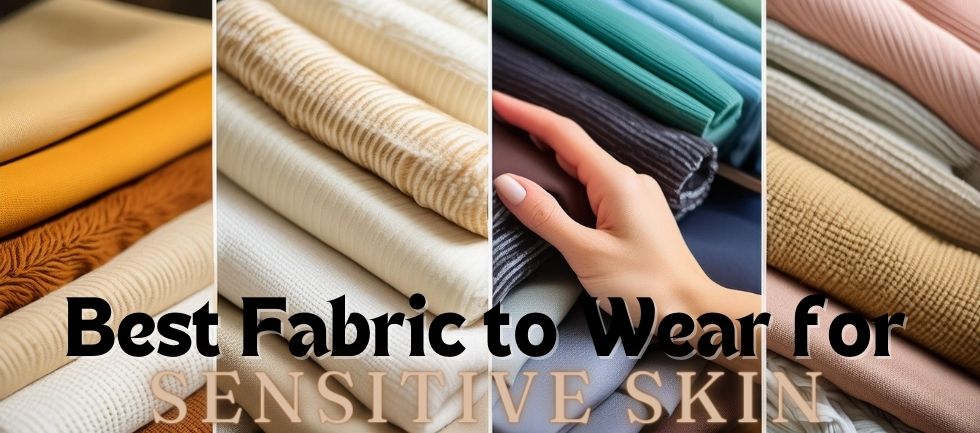Sensitive skin can be a challenging condition to manage, especially when it comes to choosing the right clothing fabrics. The wrong material can lead to itching, redness, rashes, and discomfort, exacerbating the skin's sensitivity. This makes it crucial for individuals with sensitive skin to be discerning about the fabrics they wear. While fashion trends and personal preferences play significant roles in wardrobe choices, for those with sensitive skin, comfort and skin health must take precedence.
Best Fabric to Wear if you have Sensitive Skin
Understanding the best fabrics to wear can significantly enhance the quality of life for individuals with this condition, allowing them to enjoy both comfort and style without compromising their skin's health.
Fabrics vary widely in their properties, and not all are created equal when it comes to accommodating sensitive skin. Natural fibers generally tend to be more skin-friendly compared to synthetic ones, but even among natural fibers, some are better suited for sensitive skin than others. Additionally, the way fabrics are processed and dyed can also impact their suitability for sensitive skin. Here we will discuss the best options for sensitive skin, and providing tips on how to care for these fabrics to maintain their skin-friendly properties.
Cotton: The Ultimate Comfort
Cotton fabric is often hailed as the best fabric for sensitive skin due to its natural properties and breathability. As a natural fiber, cotton allows air to circulate around the skin, reducing the risk of irritation caused by trapped heat and moisture. This breathability is crucial for preventing conditions like heat rash and minimizing the growth of bacteria and fungi that thrive in moist environments.
One of the primary reasons cotton is recommended for sensitive skin is its softness. High-quality cotton, especially in its organic form, is free from harsh chemicals and synthetic fibers that can aggravate the skin. Cotton’s softness provides a gentle touch, minimizing friction and reducing the likelihood of chafing or abrasions. This makes cotton an excellent choice for everyday wear, including undergarments and sleepwear.
Cotton is also known for its hypoallergenic properties. Unlike some synthetic fabrics, which can contain dyes and chemicals that trigger allergic reactions, cotton is less likely to cause skin allergies. Organic cotton, in particular, is grown without pesticides and processed without harsh chemicals, making it an even safer choice for individuals with sensitive skin.
Silk: Smooth and Soothing
Silk is another fabric highly recommended for those with sensitive skin. Known for its smooth texture and luxurious feel, silk fabric provides a gentle, frictionless contact with the skin. This smoothness reduces the risk of irritation, making silk ideal for people with conditions such as eczema or dermatitis, where the skin is particularly vulnerable.
Silk has excellent moisture-wicking properties, which means it can absorb and evaporate moisture quickly. This ability helps to keep the skin dry and comfortable, preventing the build-up of sweat and reducing the likelihood of skin irritation. Silk’s natural temperature-regulating properties also keep you cool in the summer and warm in the winter, providing comfort throughout the year.
Silk is naturally hypoallergenic and has antibacterial properties. It is resistant to dust mites, mold, and mildew, which are common allergens that can exacerbate skin conditions. The natural proteins in silk can soothe irritated skin, promoting healing and reducing inflammation. These properties make silk a beneficial fabric for sensitive skin, offering both comfort and protection.
Velvet: Soft and Luxurious
Velvet is a fabric that combines softness with a luxurious feel, making it a good option for sensitive skin. The plush surface of velvet is gentle against the skin, reducing friction and the risk of irritation. This softness is particularly beneficial in colder weather, providing warmth and comfort without causing skin issues.
Velvet is often made from a blend of natural fibers such as cotton and silk, enhancing its suitability for sensitive skin. When choosing velvet, it’s essential to opt for blends that do not contain synthetic fibers like polyester, which can irritate sensitive skin. Natural fiber velvets are breathable and allow for better air circulation, maintaining skin comfort.
While not as moisture-wicking as silk, velvet does offer some moisture-resistant properties, particularly when made from cotton or silk blends. This can help keep the skin dry and prevent irritation caused by dampness. Velvet’s dense pile also provides a protective barrier against cold air, making it an excellent fabric for winter clothing for those with sensitive skin.
Linen: Soft and Warm
Linen is renowned for its breathability and lightweight nature, making it a top choice for sensitive skin. The natural fibers of linen allow for excellent air circulation, which helps to keep the skin cool and dry. This is particularly beneficial in hot and humid climates, where excessive sweating can lead to skin irritation and discomfort.
One of the unique qualities of linen is that it becomes softer with each wash. Initially, linen might feel a bit coarse, but it quickly softens while maintaining its strength and durability. This increasing softness makes linen more comfortable for sensitive skin over time, reducing friction and irritation.
Linen is hypoallergenic and has natural antibacterial properties, making it ideal for people with allergies and sensitive skin. It is resistant to mold and mildew, which can cause skin reactions. The hypoallergenic nature of linen helps to prevent allergic reactions and skin irritations, providing a safe and comfortable fabric choice for daily wear.
Bamboo: Eco-Friendly Comfort
Bamboo fabric is an excellent choice for sensitive skin due to its softness and eco-friendly properties. Bamboo fibers are naturally smooth and round, which reduces friction against the skin. This softness makes bamboo an ideal fabric for those with sensitive or easily irritated skin. Additionally, bamboo is a sustainable and renewable resource, making it an environmentally friendly choice.
Bamboo fabric is highly breathable and has excellent moisture-wicking properties. It can absorb moisture from the skin and evaporate it quickly, keeping the skin dry and comfortable. This helps prevent skin irritation caused by excessive sweating and moisture buildup. The breathability of bamboo also aids in temperature regulation, keeping you cool in the summer and warm in the winter.
Bamboo has natural antibacterial and hypoallergenic properties. It is resistant to bacteria, mold, and mildew, which can cause skin irritations and allergic reactions. The hypoallergenic nature of bamboo fabric makes it suitable for individuals with sensitive skin, providing a soothing and comfortable experience.
Merino Wool: Cool and Breathable
Merino wool is a unique type of wool that is incredibly soft and fine, making it suitable for sensitive skin. Unlike traditional wool, which can be coarse and itchy, merino wool has a smooth texture that reduces friction against the skin. This softness makes merino wool an excellent choice for sensitive skin, especially in colder climates where warmth is essential.
Merino wool is known for its exceptional moisture-wicking properties. It can absorb moisture from the skin and release it into the air, keeping the skin dry and comfortable. This breathability helps regulate body temperature, ensuring you stay warm without overheating. The moisture-wicking ability of merino wool prevents skin irritation caused by dampness and sweat.
Merino wool has natural antibacterial properties, making it resistant to odor-causing bacteria. This helps keep the fabric fresh and reduces the risk of skin irritation. Additionally, merino wool is hypoallergenic, making it less likely to cause allergic reactions. These properties make merino wool a great fabric choice for individuals with sensitive skin, providing both comfort and protection.
Tencel (Lyocell): Smooth and Sustainable
Tencel, also known as Lyocell, is a fabric made from wood pulp, typically from eucalyptus trees. It is known for its incredible softness and smooth texture, which is gentle on sensitive skin. The smooth fibers of Tencel reduce friction, minimizing the risk of irritation and providing a comfortable experience for those with sensitive skin.
Tencel has excellent moisture-wicking properties, absorbing moisture from the skin and releasing it into the air. This helps keep the skin dry and prevents irritation caused by excessive sweating. The breathability of Tencel also aids in regulating body temperature, ensuring comfort in both warm and cool conditions.
Tencel is an eco-friendly fabric, produced through a sustainable process that minimizes environmental impact. It is biodegradable and compostable, making it a green choice for clothing. Additionally, Tencel is hypoallergenic, making it suitable for individuals with sensitive skin and allergies. Its smooth texture and moisture-wicking properties make it a top choice for comfort and skin health.
Fabrics to Avoid
While some fabrics are beneficial for sensitive skin, others can cause irritation and discomfort. Here are some fabrics to avoid if you have sensitive skin:
- Polyester
Polyester is a synthetic fabric that can trap heat and moisture, leading to skin irritation and discomfort. It is not as breathable as natural fibers, which can exacerbate skin conditions like eczema. Polyester is also treated with various chemicals during production, which can cause allergic reactions in sensitive individuals.
- Nylon
Nylon is another synthetic fabric that can trap heat and moisture, leading to skin irritation. It is often treated with chemicals that can cause allergic reactions. Nylon's lack of breathability can make it uncomfortable for those with sensitive skin.
FAQs
Is 100% Cotton Good for Sensitive Skin?
Yes, 100% cotton is excellent for sensitive skin. It is a natural fiber that is soft, breathable, and hypoallergenic. Cotton allows air to circulate, keeping the skin cool and dry, which helps to reduce irritation and rashes. It is free from harsh chemicals and synthetic fibers that can cause reactions, making it a safe and comfortable choice for individuals with sensitive skin.
Is Polyester Good for Sensitive Skin?
No, polyester is generally not recommended for sensitive skin. It is a synthetic fabric that can trap heat and moisture, leading to skin irritation and discomfort. Polyester is also treated with various chemicals during production, which can cause allergic reactions in sensitive individuals. For those with sensitive skin, it is better to opt for natural fibers like cotton, silk, or linen, which are gentler and more breathable.
Conclusion
Choosing the right fabric is crucial for individuals with sensitive skin. Cotton, silk, velvet, linen, bamboo, merino wool, and Tencel all offer unique benefits that cater to the needs of sensitive skin. These fabrics are known for their softness, breathability, and hypoallergenic properties, making them ideal choices for comfort and skin health. By selecting clothing made from these materials, you can reduce the risk of skin irritation and enjoy a more comfortable and soothing experience.



